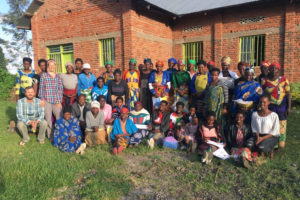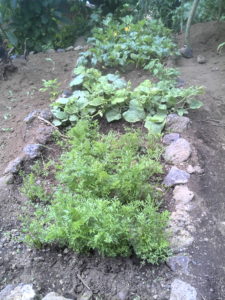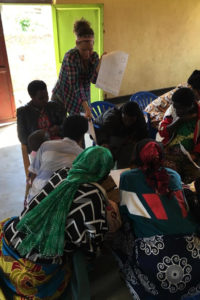In May 2019, Brittney Sly, a doctoral student in the Department of Food Science and Human Nutrition at Colorado State University, embarked on her second research trip to Burera, a district in the northern part of Rwanda.

The village was wet with rain, and the earthy smell of mud and grass filled the air. The research participants, a group of local Rwandan women, were excited to welcome Sly back. It had been six months since she was last here, introducing the concept of kitchen gardens and collecting baseline data. Now, she returned to assess the progress.
“The participants acted as my guides throughout my stay in the community,” Sly said. “Having them proudly show me their gardens and hearing them talk about their journey and experiences with this project was amazing.”
With efforts surrounding kitchen gardens, Sly intends to find out if she can help establish a sustainable dietary pattern to address malnutrition on a community level.
Battle against malnutrition
Despite Rwanda’s impressive economic growth in recent years, household food insecurity and undernutrition remain a challenge.

In Burera, the majority of the population practice subsistence agriculture. Irish potatoes, maize, and beans are the most grown crops and also make up most of local Rwandans daily diets. The lack of food diversity plus a high level of poverty lead to an alarming rate of malnutrition. A 2018 report finds that 49 percent of the children between 6 to 59 months were suffering from chronic malnutrition.
Sly, with support from a Colorado-based non-profit organization, saw kitchen gardens as a potential solution. She is helping women in Burera to develop small subsistence plots that could bring more balanced meals to the local households.
Sustainable dietary patterns
Sly has always had a passion for food – eating food, cooking food, studying food, and most importantly, educating others about food. She earned her B.S. in human nutrition from CSU and her M.P.H in global health and health disparities from the Colorado School of Public Health. As a registered dietitian nutritionist, she has been working for CSU’s Housing & Dining Services since 2007.

Sly knows kitchen gardens are only one piece of the puzzle to win the battle against malnutrition. Planting seeds in people’s hearts and minds is just as important as planting gardens.
“The factors that influence diet are numerous and complex,” Sly said. “It is never just about the food, but rather the multitude of experiences, perspectives, and abilities each person possesses. All those factors influence what people eat and how much.”
During her stay in Burera, Sly held extensive group sessions aimed to empower the rural Rwandan women. The sessions expanded the women’s existing agricultural and nutritional knowledge, and provided them with tools and directions to move forward. The women also discussed the best way to strategically share the knowledge with the whole community.
Ripple Effect
Only four months into the project, Sly was excited to find that the impacts had already gone beyond the individual participants.
“Several participants mentioned that they were asked by their neighbors to help create additional gardens,” she said. “And these requests for knowledge seem to really increase the women’s sense of empowerment.”
Sly is returning to Rwanda in September for more data collection focused on the changing dietary pattern and increasing food security.
The Department of Food Science and Human Nutrition is part of CSU’s College of Health and Human Sciences.